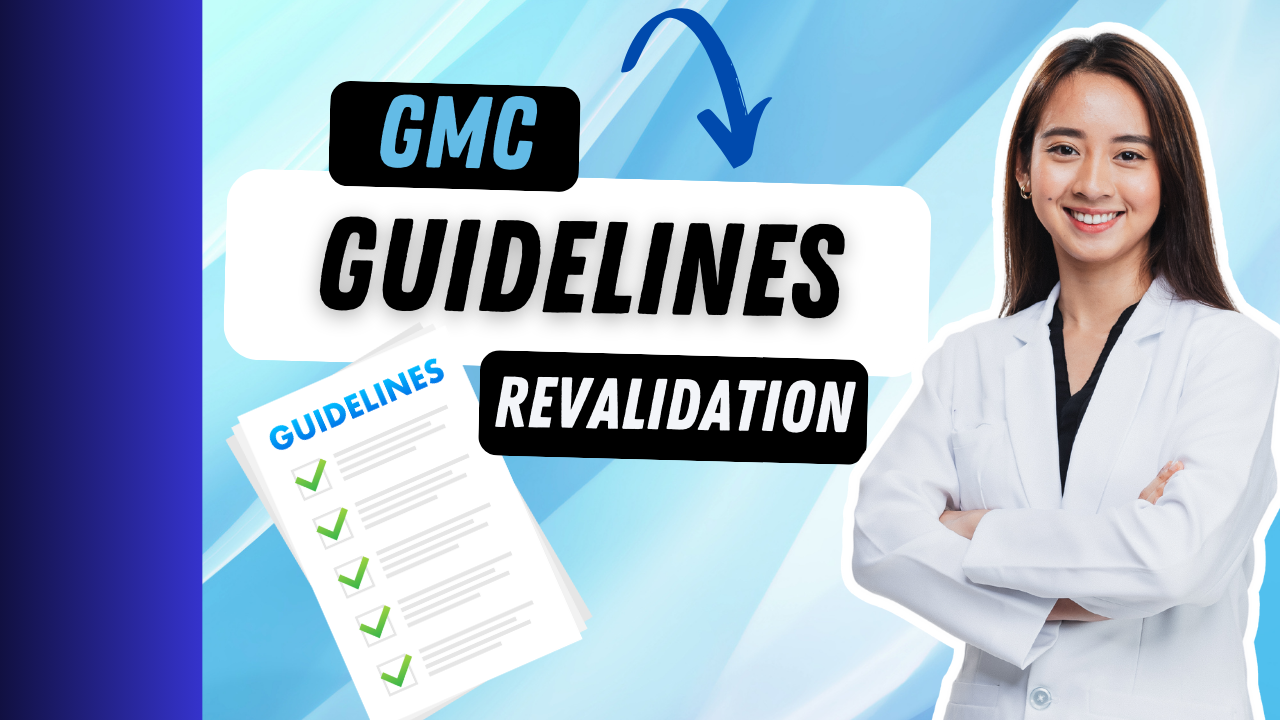
GMC guidance on supporting information for revalidation
Introduction
The General Medical Council (GMC) provides guidance on supporting information for revalidation to ensure that doctors maintain high standards of professionalism, competence, and patient care throughout their careers. This summary explores the key principles, requirements, and considerations outlined in the GMC guidance, highlighting the importance of robust documentation, reflective practice, and engagement with the revalidation process.
Understanding Revalidation and Supporting Information
Revalidation is a regulatory mechanism implemented by the GMC to assess and affirm the continued fitness to practice of doctors. Supporting information forms an integral part of the revalidation process, providing evidence of a doctor's ongoing professional development, clinical competence, and adherence to ethical standards.
Key Principles and Requirements
The GMC guidance outlines key principles and requirements for supporting information, emphasizing the need for relevance, accuracy, completeness, and authenticity in documentation. Doctors are expected to maintain comprehensive records of their clinical practice, including patient feedback, audit outcomes, significant events, complaints, and compliments, to demonstrate their commitment to reflective practice and continuous improvement.
Types of Supporting Information
The GMC guidance categorizes supporting information into four main types:
1. Continuing Professional Development (CPD): Doctors are required to engage in CPD activities relevant to their specialty area, documenting learning outcomes, participation in courses, conferences, workshops, and self-directed learning activities.
2. Quality Improvement Activities: Doctors are encouraged to participate in quality improvement initiatives aimed at enhancing patient safety, clinical outcomes, and service delivery. This may include involvement in clinical audits, peer review processes, clinical governance activities, and research projects.
3. Significant Events and Feedback: Doctors are expected to reflect on significant events in their clinical practice, including adverse incidents, near misses, and complaints, and demonstrate learning and improvement as a result. Feedback from colleagues, peers, patients, and other stakeholders should be sought and documented to gain insight into areas for development and improvement.
4. Complaints & Compliments: Doctors should maintain records of complaints, compliments, and thank you cards received from patients and colleagues, demonstrating their responsiveness to feedback and commitment to patient-centered care.
Reflection and Personal Development Planning
Reflection forms an essential component of the revalidation process, enabling doctors to critically evaluate their clinical practice, identify strengths, weaknesses, and areas for development, and develop personalized development plans to address learning needs and enhance professional practice.
Ensuring Compliance and Quality Assurance
Designated bodies and responsible officers play a crucial role in ensuring compliance with revalidation requirements and maintaining quality assurance in the collection, review, and verification of supporting information. Regular appraisals provide opportunities for doctors to discuss their supporting information with appraisers, receive feedback, and identify areas for improvement.
Challenges and Pitfalls in Collecting Supporting Information for Medical Appraisal
Medical appraisals plays a crucial role in assessing the performance, competency, and development needs of healthcare professionals. It relies heavily on the collection of supporting information to provide a comprehensive evaluation. However, this process is fraught with challenges and pitfalls that can hinder its effectiveness and accuracy. This summary explores the various obstacles encountered in collecting supporting information for medical appraisal and suggests strategies to mitigate them.
1. Data Accessibility:
One of the primary challenges in collecting supporting information for medical appraisal is the accessibility of relevant data. Healthcare professionals often work across multiple settings and electronic systems, leading to fragmentation of data. As a result, accessing comprehensive and up-to-date information becomes cumbersome and time-consuming. Moreover, interoperability issues between different electronic health record systems further exacerbate this challenge.
2. Data Quality and Reliability:
Even when data is accessible, its quality and reliability pose significant concerns. Inaccuracies, inconsistencies, and missing information are common pitfalls encountered during data collection. Healthcare professionals may inadvertently document incomplete or erroneous data, leading to distorted assessments of performance and competency. Additionally, variations in documentation practices among different healthcare settings contribute to discrepancies in data quality.
3. Compliance with Regulatory Requirements:
Medical appraisal processes must adhere to regulatory requirements and professional standards to ensure validity and fairness. However, navigating through complex regulatory frameworks and compliance guidelines can be daunting. Healthcare organizations must stay abreast of evolving regulations and standards to ensure that the collection of supporting information aligns with legal and ethical principles. Failure to comply with regulatory requirements can undermine the integrity of the appraisal process and erode trust among healthcare professionals.
4. Privacy and Data Security:
The collection and storage of sensitive healthcare information raise concerns regarding privacy and data security. Healthcare organizations must implement robust measures to safeguard confidential data against unauthorized access, breaches, and misuse. Compliance with stringent data protection regulations, such as the Health Insurance Portability and Accountability Act (HIPAA), is essential to maintain patient confidentiality and trust. However, ensuring compliance while facilitating seamless data sharing for appraisal purposes remains a formidable challenge.
5. Stakeholder Engagement and Collaboration:
Effective medical appraisal relies on the active engagement and collaboration of multiple stakeholders, including healthcare professionals, administrators, regulatory bodies, and patients. However, fostering meaningful engagement and collaboration across diverse stakeholder groups can be challenging. Communication barriers, conflicting interests, and power dynamics may impede collaboration efforts and hinder the collection of comprehensive supporting information. Building a culture of trust, transparency, and mutual respect is imperative to overcome these challenges and promote collaborative appraisal processes.
Conclusion
In conclusion, the GMC guidance on supporting information for revalidation provides doctors with clear expectations, guidelines, and principles for documenting their professional practice and demonstrating ongoing competence, professionalism, and commitment to patient care. By engaging in reflective practice, maintaining comprehensive records, and participating in quality improvement activities, doctors can fulfill the requirements for revalidation and uphold the highest standards of medical practice. healthcare organizations must navigate through a complex landscape to ensure the effectiveness and integrity of the appraisal process. By addressing these challenges proactively and implementing targeted strategies, healthcare organizations can enhance the reliability, fairness, and validity of medical appraisal outcomes, ultimately contributing to the continuous improvement of healthcare delivery and patient outcomes.
Watch the video on this blog at our YouTUbe channel below
